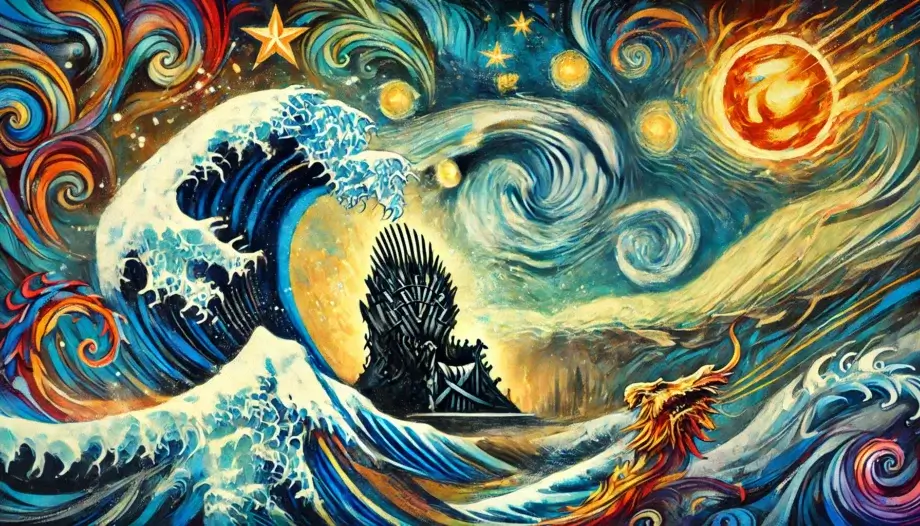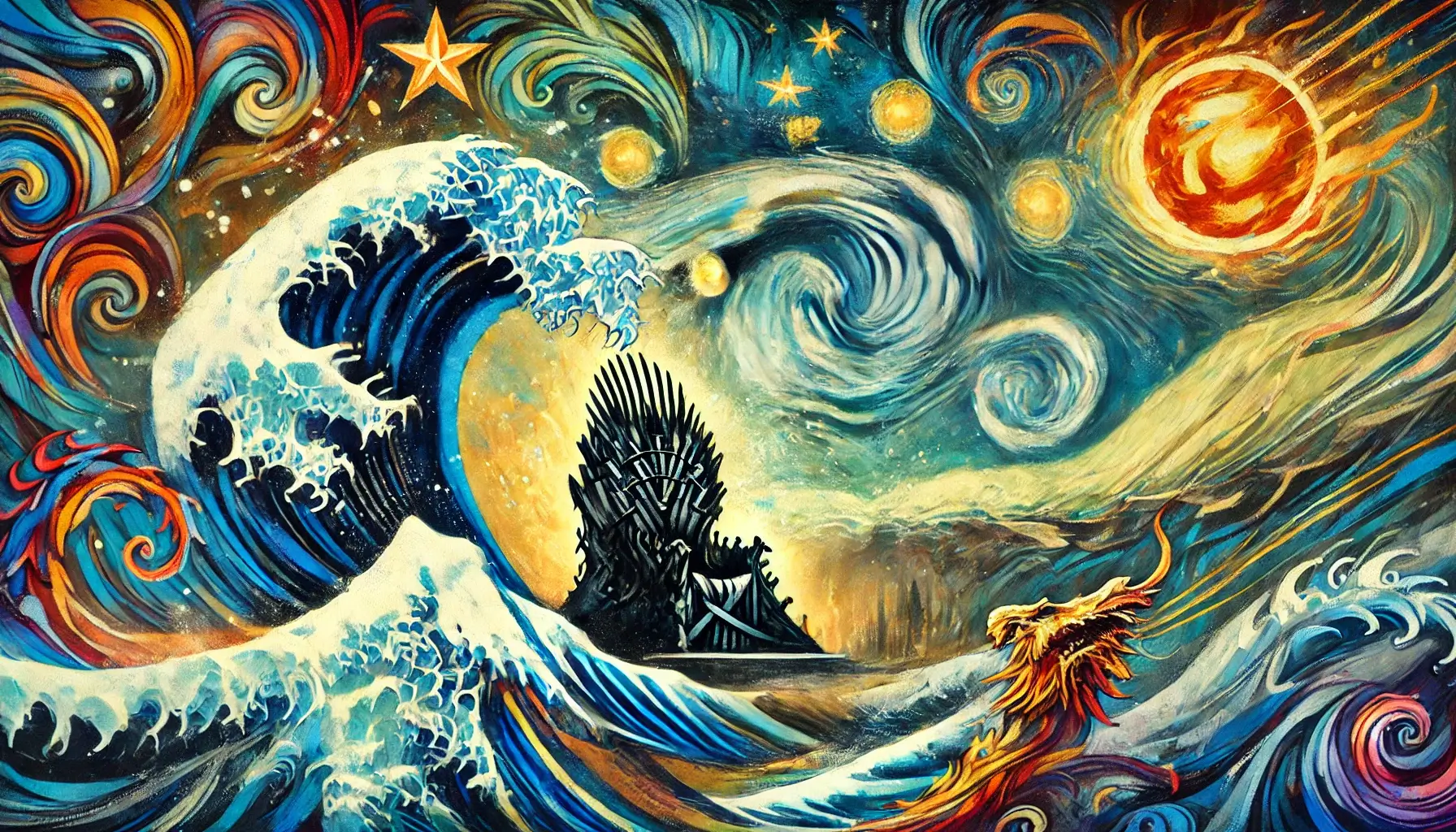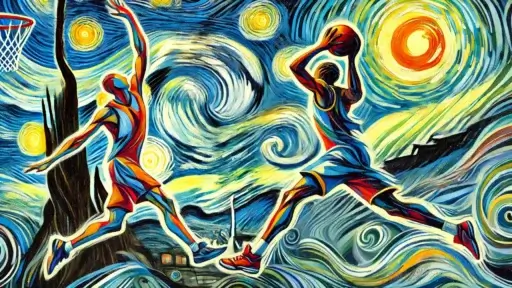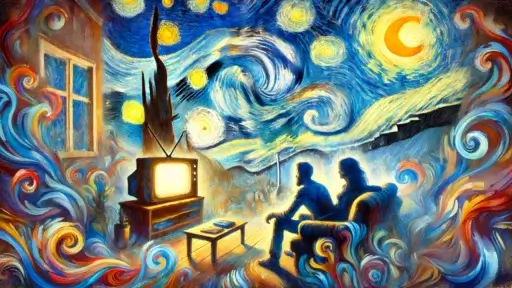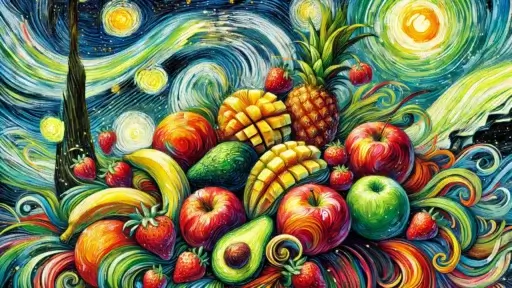“What we have once enjoyed we can never lose. All that we love deeply becomes a part of us.”
Helen Keller
When I was young, I had this idea that the important things in life—the things that really mattered—were big. Grand gestures, monumental events, achievements with fanfare and applause. You know, the kind of moments you’d tell your grandkids about someday, if they cared to listen between scrolling through whatever futuristic social media their neural implants allowed.
But as the years went on, I realized that the things that truly shaped me, the ones that left the deepest impressions, weren’t loud or flashy. They were small, almost quiet, often slipping in under the radar when I wasn’t paying attention.
One of those things? Television.
Not the “I binged TV for 10 hours and felt my soul leave my body” kind of television. I mean the kind of shows that made you think, or laugh until you snorted, or—even rarer—cry when you didn’t expect it. The kind of shows that didn’t just entertain, but connected.
Maybe it’s because we all need a little escape from our daily grind, or maybe it’s just that TV has a way of sneaking up on you with profound truths, but over time, I found that some shows had become part of my emotional DNA.
This list isn’t just a rundown of my favorite TV shows; it’s a love letter to the ones that mattered. The ones that made a difference in small but powerful ways. The ones that reminded me, in the midst of everything, what it means to feel, to laugh, to think.
Everybody Loves Raymond
Everybody Loves Raymond is the kind of show that makes you laugh, cringe, and occasionally mutter, “That’s too real.” Sure, the dynamics between Ray, Debra, and the rest of the Barone clan are exaggerated, but underneath all the yelling and eye-rolls lies an unsettlingly familiar reality. The in-laws who linger just a bit too long, the sibling rivalry simmering quietly for decades, the endless diplomatic dance of marriage—it felt like looking into a comedic mirror of everyday life, except the punchlines landed far more reliably.
What makes Everybody Loves Raymond stand out is how it balanced its humor with heart. One minute you’re laughing at Ray’s utter helplessness around the house; the next, you’re blindsided by an unexpectedly heartfelt moment that hits closer to home than you’d care to admit.
The characters were flawed, but they were also deeply loving, and no matter how many arguments or miscommunications they had, you always knew they’d stick together. It was this emotional core that made the show more than just a sitcom—it made it feel like family.
And then there’s the finale—a rarity in TV land. So many great shows stumble at the finish line, but Everybody Loves Raymond nailed it. The last episode wasn’t about shocking twists or grand gestures; it was simple, heartfelt, and exactly what you wanted for the Barone family. It felt like a natural, fitting goodbye, wrapping up years of laughter and love in a way that left you smiling, even through the tears.
Everybody Loves Raymond didn’t just make me laugh—it reminded me that, despite all the chaos, misunderstandings, and drama… family really is worth the trouble.
And for that, it’ll always have a special place in my heart.
Freaks & Geeks
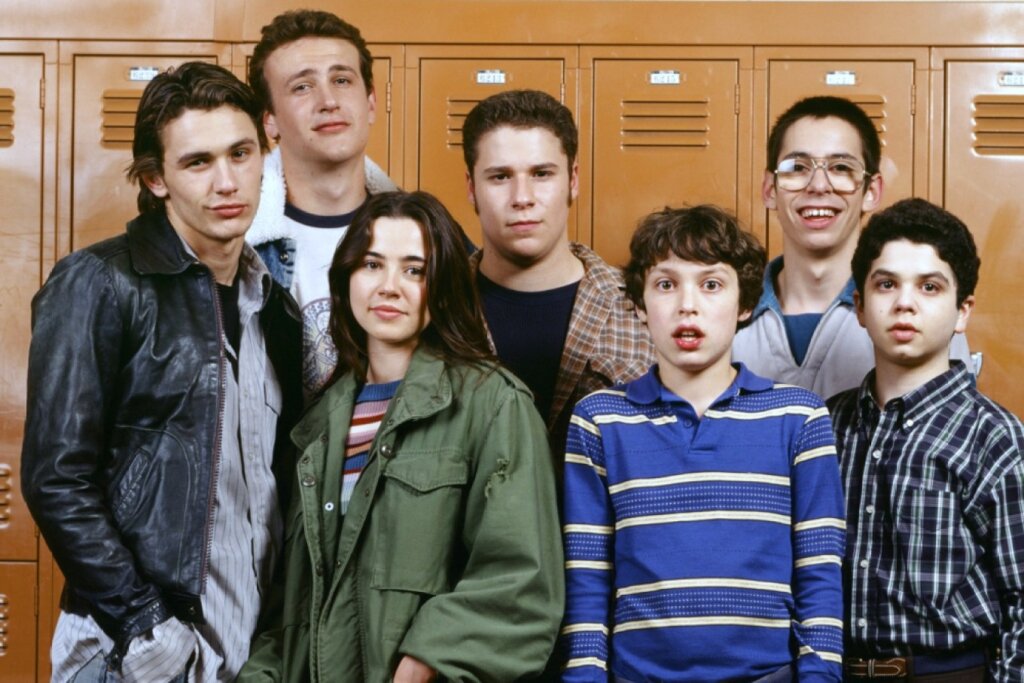
I came to Freaks & Geeks late—very late. But from the first episode, it felt like it had always been waiting patiently for me to discover it, knowing it would quietly slip into my emotional hall of fame.
Maybe it’s because the show nailed the awkwardness and tenderness of adolescence better than anything else I’ve seen. It was funny, yes—often painfully so—but it was never just about the punchlines. Freaks & Geeks captured something subtle and honest about being young and unsure, trying on different identities and quietly hoping someone—anyone—would notice.
Watching Lindsay navigate between worlds—the pull of rebellion and the comforting familiarity of the life she knew—resonated deeply with me. Who hasn’t felt caught between versions of themselves, unsure which one felt more authentic? Meanwhile, Sam and his friends were essentially reminders of my own younger self: earnest, awkward, and tragically confident that popularity was always just one perfect outfit away.
But what made Freaks & Geeks truly special wasn’t just how it captured teenage anxiety and humor—it was its incredible empathy. The show loved its characters fiercely, even (especially) when they made terrible decisions or struggled embarrassingly to fit in. It reminded me how important it is to be patient with people, including myself, because everyone is just quietly fumbling their way through.
And perhaps that’s what hit me the hardest: the beautiful, messy authenticity of these characters’ lives. They weren’t heroes or villains—just kids stumbling through friendships, heartbreaks, and ordinary disappointments, trying desperately to figure things out.
As the final credits rolled, I felt a surprising sense of gratitude—and maybe a little wistfulness, knowing that the show had been unjustly cut short. But in some ways, it seemed right that a series so lovingly focused on life’s awkward, unfinished moments would itself remain beautifully unfinished, just like adolescence itself.
And somehow, discovering it decades later felt perfectly timed. It wasn’t just nostalgia; it was a gentle reminder that growing up never really ends—that we’re all still figuring things out, still awkward, still hopeful. And that maybe being a little bit of a freak or a geek isn’t such a bad thing after all.
Friday Night Lights
Friday Night Lights was supposed to be about football, but like most great shows, it was sneakily about everything else—especially about how complicated it is to be the person everyone’s counting on. And let’s be clear: no one had a tougher gig than Coach Eric Taylor.
Coach Taylor was the kind of guy who always seemed one half-time speech away from figuring out life’s mysteries, but who still spent most episodes looking mildly annoyed that he had to explain the obvious. Being Coach Taylor wasn’t easy. He carried the expectations of an entire small Texas town on his shoulders, all while managing hormonal teenagers, meddling boosters, and a perpetual look of exasperation that somehow only made him more relatable.
But part of what made Coach Taylor genuinely great—and entertaining to watch—was that he never pretended to have all the answers. Lucky for him, he had Tami Taylor. Tami was more than just the show’s moral compass—she was the one who called him on his nonsense, offered perspective when he got tunnel vision, and somehow managed to wrangle his stubbornness without breaking a sweat.
Every team needs a Coach Taylor, the calm voice amidst the chaos, the steady hand guiding everyone else through uncertainty. But just as importantly, every Coach Taylor needs someone like Tami to remind him he’s not actually as smart as he thinks he is.
In the end, Friday Night Lights wasn’t perfect, and neither was Coach—but that’s exactly why I loved it. It was beautifully human: funny, messy, heartfelt, and real. The kind of show that made me laugh unexpectedly, feel embarrassingly strong emotions, and wonder how fictional people could possibly mean so much.
Clear eyes, full hearts, still crying.
Game of Thrones
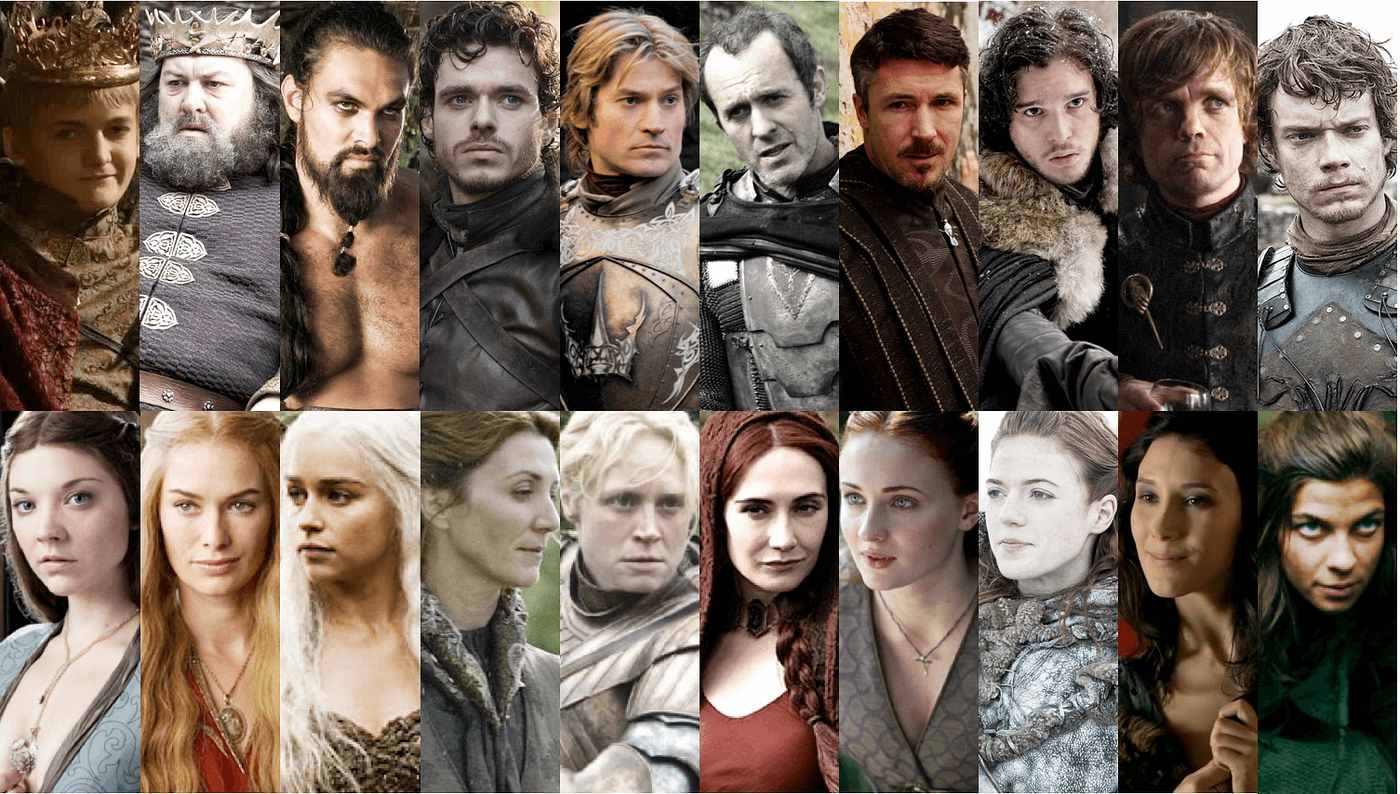
Some shows make you question why you spent countless weeks of your life glued to the screen, but then there’s Game of Thrones, which had me seriously wondering if my soul was now permanently owned by HBO.
From the moment those opening credits rolled, with that theme music surging like the battle anthem of my procrastination, I was powerless to resist. Game of Thrones wasn’t just a show; it was a full-blown, appointment-TV cultural phenomenon. Sunday nights weren’t about winding down—they were about gearing up for a weekly emotional trauma, usually delivered by someone holding a sword, a goblet, or both.
The characters were everything. So many characters—and let’s be honest, way too many to keep track of without some kind of medieval spreadsheet. Yet somehow, they were all amazing. I found myself genuinely caring about the life choices of fictional people whose decisions mostly involved dragons, direwolves, or questionable family dynamics.
Sunday nights became sacred rituals in our house. Once we’d successfully tricked—I mean tucked—the kids into bed, we’d gather to prepare our special Game of Thrones cocktail, affectionately dubbed “Mangria.” Nothing fancy, just wine plus something strong enough to help us emotionally cope with whatever fresh hell awaited. We’d toast to imminent betrayal, unexpected beheadings, and our favorite characters’ shockingly poor decision-making skills, before being utterly transported to a place where dragons soared, alliances shifted like quicksand, and everyone was a single misstep away from becoming a cautionary tale.
Even now, when someone mentions the show, I can’t help but grin—like one of those slightly unhinged smiles Littlefinger wore so well. Jon Snow trudging heroically into yet another bad idea, Arya setting sail like she’d finally had enough of everyone’s nonsense, or Tyrion sipping wine and marveling sarcastically at the epic disaster surrounding him—they’re not just characters. They’re survivors of a TV marathon that tested friendships, marriages, and our collective emotional stability.
And I’d happily do it all over again tomorrow.
Bonus!
My friend Bryan Funk and I once recorded an episode of our wildly popular (insert sarcasm here) Game of Thrones podcast, A Pod Has No Name. We made it exactly one episode in. We quickly realized that one episode was enough, but it was a lot of fun.
Late Night with Conan O’Brien
There are shows you watch casually, and then there are shows you fall head-over-heels for, staying up way past a responsible bedtime to see what delightful nonsense comes next. For teenage me, Late Night with Conan O’Brien was gloriously, irresponsibly, unquestionably the latter.
Conan arrived on my screen like an awkward, lanky tornado of absurdity, immediately unlike anything late-night had dared to try before. He didn’t just deliver jokes; he reveled in the weird, celebrated the nonsensical, and built entire segments around concepts so wonderfully dumb you couldn’t help but laugh—often at Conan himself. Watching Conan flail around stage with his self-deprecating grin and deliberately bad dance moves was oddly comforting, proof that comedy didn’t need polish to be brilliant.
But beneath all the bizarre skits and recurring characters (who knew a foul-mouthed, cigar-chomping puppet dog could become one of late-night TV’s most iconic commentators?), Conan had a rare gift: he made viewers feel genuinely included. He turned awkwardness into camaraderie, inviting us into the joke rather than performing it at us. This wasn’t late-night as usual; it was late-night as playful anarchy, where unpredictability was the main attraction.
Beyond the humor, Conan himself became someone worth rooting for. His sincerity, vulnerability, and unpretentious kindness turned him from mere host to oddly relatable friend—albeit one who could make any mundane scenario deeply, hilariously weird.
There was something refreshingly brave in how openly Conan embraced failure and awkwardness, reminding teenage me (and adult me, for that matter) that the best laughs often come from not taking yourself too seriously.
In the end, Late Night with Conan O’Brien was more than a show; it was permission to embrace silliness, lean into absurdity, and celebrate life’s messy imperfections.
And if staying up late to watch a grown man lovingly roast himself night after night wasn’t the most educational use of my teenage years… well, I regret nothing.
Parks and Recreation
Somehow, Parks and Recreation convinced me that a show about small-town government meetings, community projects, and waffle enthusiasts could actually be one of the most delightful experiences television ever had to offer. Against all reason—and logic—I found myself genuinely invested in the fate of parks, harvest festivals, and tiny horses. Go figure.
But more than local politics or Pawnee’s absurd town meetings, what truly captured my heart was the show’s quiet yet powerful emphasis on friendship. At its core, Parks and Rec was a love letter to those people who make your world feel bigger, kinder, and infinitely weirder, in the best possible way.
Leslie and Ann’s friendship was unapologetically enthusiastic—a relentless celebration of mutual support, awkward compliments, and unwavering loyalty. Their bond reminded me of how incredible it feels to have someone believe in you so completely (and sometimes unreasonably) that you almost have no choice but to believe in yourself too.
Then there was Ron and Leslie’s wonderfully bizarre dynamic—a friendship forged against Ron’s express wishes. Watching Ron’s stoic libertarianism repeatedly crash against Leslie’s aggressive optimism was comedy gold, yes, but it also underscored something profound: friendship doesn’t always look the way you expect it to. Sometimes it’s a grumpy guy begrudgingly offering quiet support to his most enthusiastic coworker, and somehow finding his life richer for it.
Even the goofier friendships—Tom and Donna’s luxurious “Treat Yo Self” camaraderie, or Andy and April’s joyful chaos—spoke to the beauty of finding someone who matches your particular brand of strange. Friendship in Pawnee wasn’t tidy or conventional, but it was always genuine. And hilarious.
By the time Parks and Recreation wrapped up, the characters felt less like fictional TV personalities and more like a wonderfully dysfunctional family of friends I genuinely cared about. They reminded me that, beneath all life’s absurdity, bureaucracy, and endless town meetings about raccoons, the people you surround yourself with—those you laugh with, rely on, and occasionally annoy—are the ones who make it all worthwhile.
Scrubs
I’m pretty sure Scrubs tricked me.
Here I thought I was tuning into a goofy medical comedy, with absurd fantasies, quirky doctors, and more bromantic moments than should probably be allowed on network TV. Then, suddenly, I found myself genuinely emotional—like, “Wait, did a sitcom featuring grown adults performing synchronized hallway musicals just make me seriously reconsider my life?” emotional.
Beneath all the surreal silliness and elaborate daydream sequences, the show quietly revealed something genuinely meaningful: that love—real, messy, imperfect love—is the heartbeat of life. JD and Turk’s ridiculous yet fiercely loyal friendship wasn’t just comic relief; it was a testament to how much richer life can be when someone accepts you exactly as you are, quirks and all.
Scrubs walked a tightrope between hilarity and heartbreak like no other show could. One moment you’re laughing at Dr. Cox’s gold-medal sarcasm; the next, you’re blindsided by deeply relatable truths about grief, compassion, and the profound strength it takes just to keep going—especially on the days when going feels impossible.
And the cast wasn’t just a collection of characters; they were flawed, funny, and fiercely human reflections of all of us. Elliot’s anxious yet earnest desire to be seen, Carla’s unwavering belief in the power of kindness, Dr. Cox’s guarded yet genuine capacity to care—they reminded me constantly that vulnerability isn’t weakness; it’s courage.
Ultimately, Scrubs resonated with me because—beneath all the jokes, daydreams, and monologgues—it captured exactly how love feels to me: in friendships that fully embrace my weirdness, relationships rooted in messy honesty, and quiet acts of compassion that sneak up and take me by surprise. It reminded me just how deeply and fiercely I love, and how meaningful it is when I let others truly see the imperfect, vulnerable parts of myself.
And yes, it also taught me life is always better with the right soundtrack—especially when you have someone to share the headphones with.
The Wonder Years
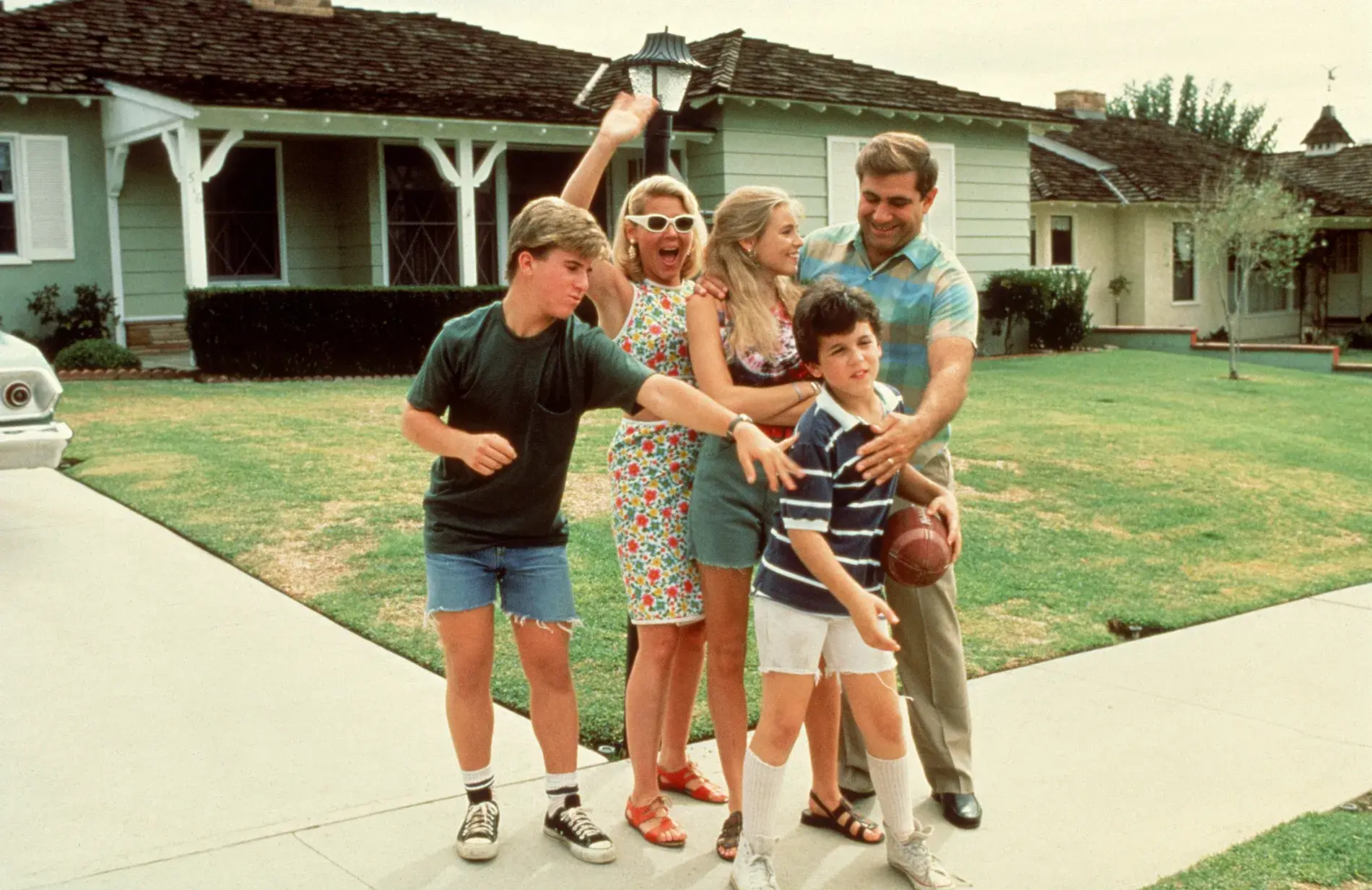
Dear The Wonder Years,
It’s strange to write a love letter to a TV show, but honestly, you’ve earned it. You slipped quietly into my life at exactly the right moment, as though someone behind the scenes had planned our meeting perfectly. While Kevin Arnold navigated junior-high hallways, fumbled through first crushes, and tried desperately (and hilariously) to seem cooler than he was, I was busy doing exactly the same thing—minus, sadly, the gentle wisdom of a mature narrator to explain what the heck was going on.
Every episode felt like a small, private conversation just between you and me. Kevin’s awkwardness? Painfully familiar. His wide-eyed confusion about love and friendship? Yep, been there. Those quiet, complicated family dinners where words hung unsaid, but everything was still somehow understood? That was my life, too. Watching you wasn’t escapism; it was therapy.
And yet, even though Kevin’s story was different enough from mine—the time period, the clothes (thankfully), and the details—the emotional truth always rang clear. Kevin, Winnie, and Paul weren’t just TV characters; they were stand-ins for my own first friendships, awkward interactions, and secret hopes. I didn’t just watch Kevin Arnold—I recognized him. He was an extension of myself, a friend who could articulate my confusion far better than I could.
Looking back now, I realize how rare you were. You weren’t flashy or loud; your power was in the quiet honesty of ordinary moments—afternoons spent riding bikes down familiar streets, whispered conversations on front porches, the simple courage required to ask someone to dance. You celebrated small moments, quietly reminding me to pay attention, because these were the times I’d carry with me forever.
Even now, decades later, the mere sound of your opening chords takes me right back—back to the old couch, sitting beside my family, feeling understood in ways I never quite expected from a TV show. You helped me see, perhaps for the first time, how precious the ordinary parts of life really are, and how love—clumsy, quiet, imperfect love—is everything.
Thank you for reminding me to cherish the small moments, for helping me understand myself a little better, and for staying with me all these years. You weren’t just entertainment—you were a quiet guide through the messiness of growing up, a mirror held gently to my own life. You didn’t just tell me a story—you made me feel seen.
And that made all the difference.
Ted Lasso
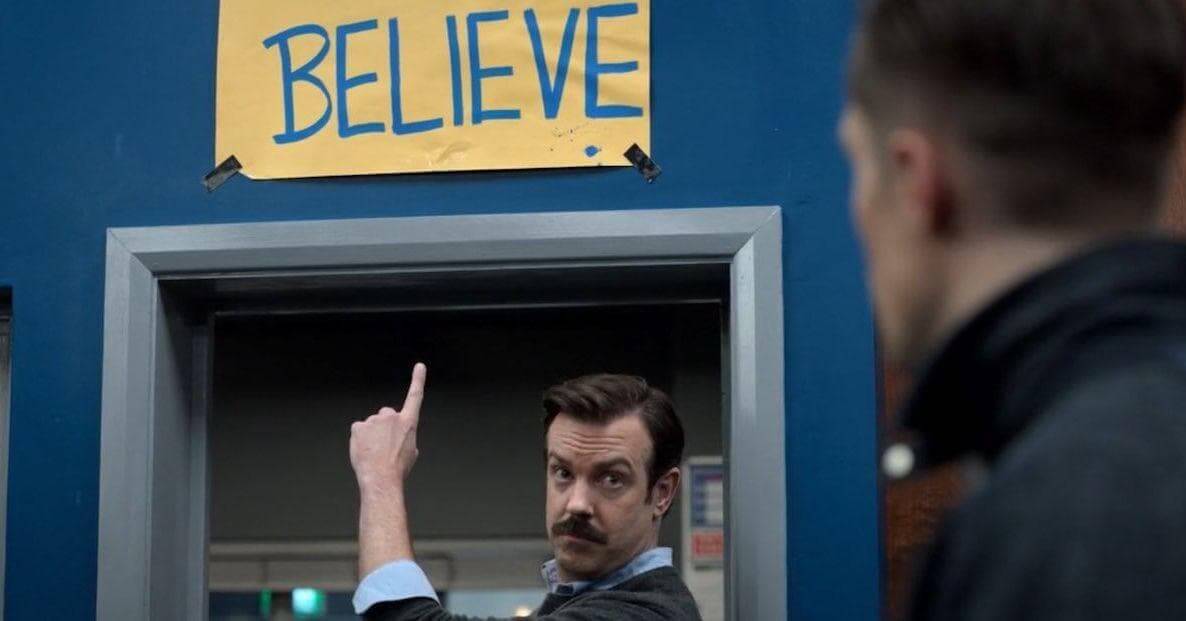
I’ve been compared to Ted Lasso a few times, and every single time it happens, I feel a little sheepish—but also deeply honored. Because Ted, despite (or maybe because of) his relentless optimism, his goofy charm, and his genuine kindness, isn’t exactly your typical TV hero. And truthfully, I take that comparison as both a compliment and a gentle challenge to keep showing up the way he does.
What resonates so deeply with me about Ted isn’t his cheerful quips or his folksy sayings, charming as they are. It’s that beneath his seemingly endless positivity lies a powerful kind of courage—the willingness to stay vulnerable, open, and generous, even when it hurts. Ted believes in people fiercely and without reservation, even (and especially) when they don’t believe in themselves. He chooses optimism as an intentional act, fully aware of how easily it can be mistaken for naiveté.
Watching Ted manage a team full of complicated, messy, wonderfully flawed people hits close to home. It’s a vivid reflection of my own belief that leadership isn’t about control or ego, but about quietly helping people discover the best versions of themselves—sometimes patiently, often messily, and always with care. Ted’s version of leadership doesn’t depend on fear or flashy speeches. Instead, it relies on simple acts of thoughtfulness and unwavering faith in people’s inherent goodness.
And perhaps what touches me the most about Ted Lasso is his capacity for personal vulnerability. Beneath his sunny exterior is real struggle—loneliness, doubt, and anxiety. His kindness isn’t effortless; it’s a deliberate choice, born out of deep empathy and real emotional labor. This hits home for me in a profoundly personal way. Like Ted, I know how much courage it takes to remain kind-hearted and open when the world around you gives you every reason not to.
Ultimately, watching Ted Lasso isn’t just enjoyable—it’s grounding. It feels like someone holding up a mirror and reminding me that genuine kindness, honest vulnerability, and sincere optimism aren’t signs of weakness; they’re a kind of quiet rebellion against cynicism. Ted’s story helps reaffirm my belief that the most meaningful way to navigate this world is with an open heart, even—especially—when it’s hard.
And if that’s who people see when they compare me to Ted, I can think of no higher honor.
My Television Hall of Fame
Good television has a way of sneaking up on you. Some shows weave themselves into the fabric of your heart, making you cry over characters who don’t exist, while others simply make you laugh until you feel a little better about what might have you down. And then there are those that arrive at just the right moment—so perfectly timed that you’re convinced the writers somehow knew exactly what you needed.
This list? It’s a collection of all those moments. Some made me think, others made me laugh, but every single one is here because, for one reason or another, it’s unforgettable.
Sitcoms / Network
- Arrested Development
- Brooklyn 99
- Everybody Loves Raymond
- Family Guy
- Fraiser
- Freaks & Geeks
- Friday Night Lights
- Friends
- King of the Hill
- King of Queens
- Late Night with Conan O’Brien
- Parks and Recreation
- Saturday Night Live
- Seinfeld
- Scrubs
- The Office (🇺🇸 + 🇬🇧)
- The West Wing
- The Wonder Years
- Wings
- 24
Cable / Streaming
- Band of Brothers
- Better Things
- Breaking Bad
- Fleabag
- Game of Thrones
- It’s Always Sunny in Philadelphia
- Schitt’s Creek
- Star Trek: The Next Generation
- Star Trek: Deep Space Nine
- Ted Lasso
- The Last Dance (ESPN doc)
- The Mandalorian
- The Wire


